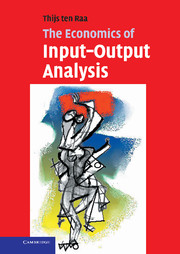Crossref Citations
This Book has been
cited by the following publications. This list is generated based on data provided by Crossref.
ten Raa, Thijs
2006.
The Theory of Benchmarking and the Measurement of Industrial Organization.
SSRN Electronic Journal,
ten Raa, Thijs
2008.
Debreu’s coefficient of resource utilization, the Solow residual, and TFP: the connection by Leontief preferences.
Journal of Productivity Analysis,
Vol. 30,
Issue. 3,
p.
191.
Luptáčik, Mikuláš
2010.
Mathematical Optimization and Economic Analysis.
Vol. 36,
Issue. ,
p.
3.
Luptáčik, Mikuláš
2010.
Mathematical Optimization and Economic Analysis.
Vol. 36,
Issue. ,
p.
87.
Settanni, Ettore
and
Emblemsvåg, Jan
2010.
Applying a non‐deterministic conceptual life cycle costing model to manufacturing processes.
Journal of Modelling in Management,
Vol. 5,
Issue. 3,
p.
220.
Bojnec, Štefan
2011.
Enterprise internationalisation by foreign investments and technical cooperation.
Industrial Management & Data Systems,
Vol. 111,
Issue. 5,
p.
697.
Blöchl, Florian
Theis, Fabian J.
Vega-Redondo, Fernando
and
Fisher, Eric O’N.
2011.
Vertex centralities in input-output networks reveal the structure of modern economies.
Physical Review E,
Vol. 83,
Issue. 4,
Soklis, George
2011.
SHAPE OF WAGE-PROFIT CURVES IN JOINT PRODUCTION SYSTEMS: EVIDENCE FROM THE SUPPLY AND USE TABLES OF THE FINNISH ECONOMY.
Metroeconomica,
Vol. 62,
Issue. 4,
p.
548.
ten Raa, Thijs
2012.
Performance measurement in an input-output framework.
Journal of Economic Structures,
Vol. 1,
Issue. 1,
TUKKER, Arnold
and
OSHITA, Yuko
2013.
EXIOBASE: A Detailed Multi-regional Supply and Use Table with Environmental Extensions.
Journal of Life Cycle Assessment, Japan,
Vol. 9,
Issue. 2,
p.
84.
Sainz, Rubén
Baños, Jose
Val, Susana
and
Kattour, Samir Jose
2013.
The economic impact of logistics infrastructure: the case of PLAZA – the Zaragoza Logistics Platform.
Transportation Planning and Technology,
Vol. 36,
Issue. 4,
p.
299.
Gilmartin, Michelle
Learmouth, David
Swales, J Kim
McGregor, Peter
and
Turner, Karen
2013.
Regional Policy Spillovers: The National Impact of Demand-Side Policy in an Interregional Model of the UK Economy.
Environment and Planning A: Economy and Space,
Vol. 45,
Issue. 4,
p.
814.
Lindberg, G.
Spissøy, A.
and
Surry, Y.
2015.
The new equine economy in the 21st century.
p.
33.
Majeau-Bettez, Guillaume
Wood, Richard
and
Strømman, Anders Hammer
2016.
On the financial balance of input–output constructs: revisiting an axiomatic evaluation.
Economic Systems Research,
Vol. 28,
Issue. 3,
p.
333.
Rodríguez-Serrano, Irene
Caldés, Natalia
De La Rúa, Cristina
Lechón, Yolanda
and
Garrido, Alberto
2017.
Using the Framework for Integrated Sustainability Assessment (FISA) to expand the Multiregional Input–Output analysis to account for the three pillars of sustainability.
Environment, Development and Sustainability,
Vol. 19,
Issue. 5,
p.
1981.
Aruka, Yuji
2017.
Some new perspectives on the inter-country analysis of the world production system.
Evolutionary and Institutional Economics Review,
Vol. 14,
Issue. 2,
p.
467.
Rodríguez, Irene
Caldés, Natalia
Garrido, Alberto
De La Rúa, Cristina
and
Lechón, Yolanda
2017.
Mediterranean Green Buildings & Renewable Energy.
p.
865.
Müller-Hansen, Finn
Schlüter, Maja
Mäs, Michael
Donges, Jonathan F.
Kolb, Jakob J.
Thonicke, Kirsten
and
Heitzig, Jobst
2017.
Towards representing human behavior and decision making in Earth system models – an overview of techniques and approaches.
Earth System Dynamics,
Vol. 8,
Issue. 4,
p.
977.
Angel, Juan Pablo
García, Diego
and
Maldonado, Norman
2017.
Revisión de metodologías para la construcción de Matrices de Contabilidad Social Regionales (MCSR).
Ensayos de Economía,
Vol. 27,
Issue. 51,
p.
125.
Flórez Bolaños, Jaime
2018.
Desarollo Rural: perspectivas múltiples para su análisis.
p.
57.





